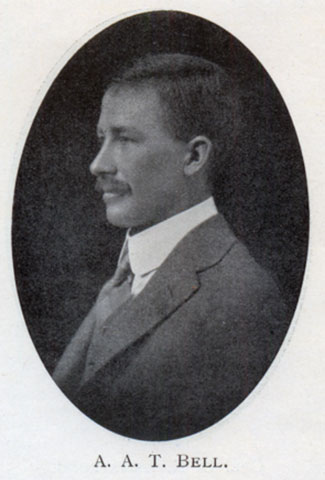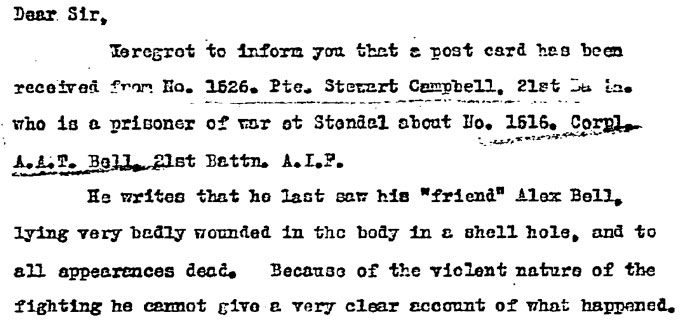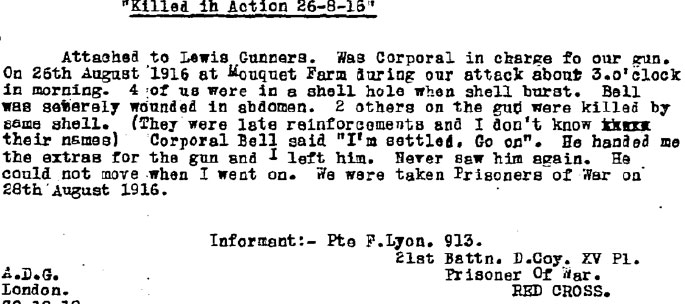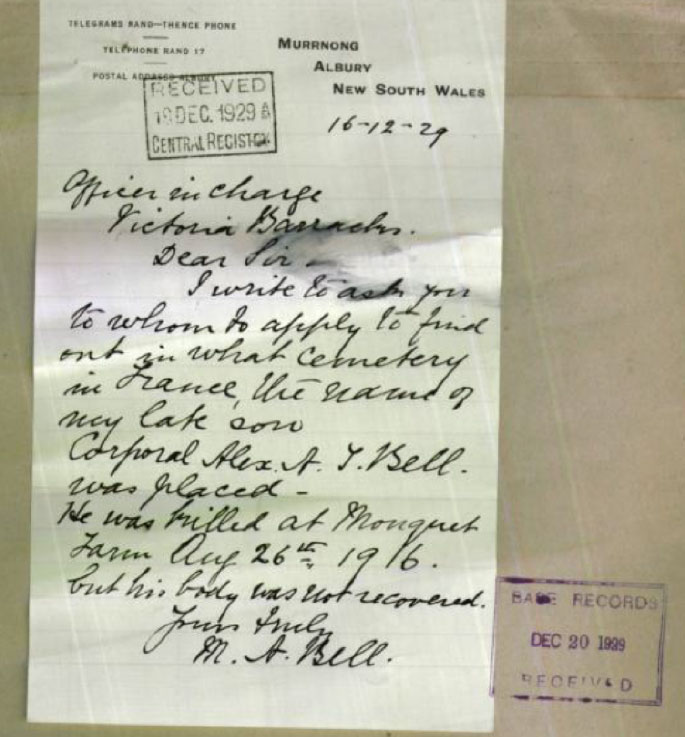Alexander Armstrong Thompson BELL

Alexander Bell was born on 1 July 1886 in Hay, New South Wales. His parents were Lewis and Mary Ann (née Armstrong) Bell. He attended Scotch from 1900 to 1903. His obituary says he was always a successful student and that he matriculated in eight subjects. His attachment to the school was apparent in his request for an extra copy of The Scotch Collegian while away at the front. His parents dedicated a prize for French and Latin at Scotch in his name. This continues as the ‘Alex Bell Prize for French’ at Year 12.
Alexander was a grazier and station overseer when he enlisted on 14 April 1915 at Melbourne. He served in the 21st Battalion with the rank of Corporal. His Regimental Number was 1516.
Alexander died on 26 August 1916 at Mouquet Farm, Pozieres, in France. He was 30 years of age.
Service record
At the outbreak of war, ‘Alex’ or ‘Alec’ Bell was working at Alma Station, his father’s property in New South Wales. After deciding to enlist, he was reportedly offered management of another large station, but stuck to his decision to volunteer. On enlisting, he was allocated to a training company at Broadmeadows. On 3 May he became a member of the 1st Reinforcements to the 21st Battalion.
After sailing from Melbourne in June 1915 he reached his battalion on 17 August 1915. He would spend just over a year with the unit before his death. Like fellow Old Scotch Collegians Jim Burns (also of the 21st Battalion) and Lindsay Adams, Alexander Bell was on board the Southland when it was torpedoed on the way to Gallipoli in September 1915. He was on Gallipoli until the evacuation. In February 1916 he was hospitalised with mumps. Before leaving Egypt he was transferred to the battalion’s machine gun section.
In France, on 17 August 1916, exactly a year after joining the battalion, he was promoted to Corporal. When the 21st Battalion went into the fight at Mouquet Farm, Pozieres on 26 August the unit suffered 457 casualties, including another Old Scotch Collegian, Ross McHutchison. Like Ross, Alexander Bell was initially posted Missing in Action that day. His service file contains testimony from Lieutenant Tait, Bell’s officer, who reported that Alex and the three Lewis machine gun teams he commanded were cut off in a group of 70 men of the battalion who were surrounded when they advanced beyond their original objective. From the testimony of two men who escaped from this pocket, Tait believed that Alec had been captured. He added that Alex was ‘a splendid fellow’, who had done ‘splendid work’ in the trenches and whose men ‘would do anything for him.’
Alec’s Red Cross Wounded and Missing file is voluminous, largely because of attempts to ascertain his fate from Australians who became prisoners of war. A telling account came in early 1917 from 1526 Private Stuart Campbell, who saw his close mate Alex badly wounded and apparently dead (see below). Another private claimed to have seen Bell struck in the arm by a bullet and then take cover in a shell hole in no man’s land. A third soldier, Private Victor Trengove, claimed to have seen Alex killed by shrapnel, ‘hit in groin, lived only a minute or two.’ Other testimonies agree that he was hit in the abdomen and soon died, including the account of Private Frank Lyon, who also saw Bell mortally wounded (see below). He reported him accepting his fate, saying ‘I’m settled. Go on’. Alex Bell was officially declared ‘Killed in Action’ by a Court of Enquiry in July 1917.
His service record contains numerous letters from his mother, including one to official historian Charles Bean, another asking for the address of a mate from Alex’s gun crew and one from 1929 asking in which cemetery Alec’s name was recorded in France and remarking that his body was never found (see below).
Alexander Bell has no known grave but is commemorated at the Australian National Memorial, Villers-Bretonneux, France .
Photographs and Documents:

1917 Letter from Vera Deakin to Alex’s cousin (Campbell, a pre-war labourer, was according to two accounts a close mate of Alec)

From Alex Bell’s Red Cross Wounded and Missing file

1929 letter from Alex Bell’s mother asking where his name was recorded
Sources:
- Australian War Memorial – Roll of Honour and Red Cross Wounded and Missing file
- Mishura Scotch Database
- National Archives of Australia – B2455, BELL A A T
- Scotch Collegian, 1916, 1918
- The AIF Project - https://www.aif.adfa.edu.au/showPerson?pid=18852